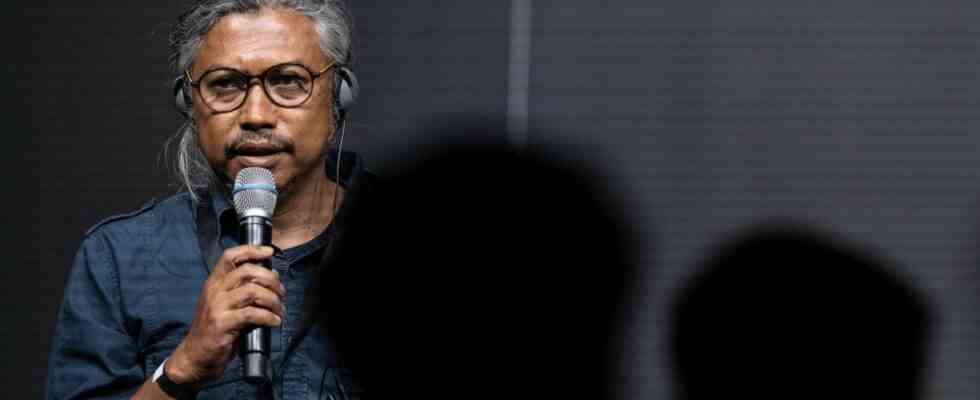“We Need to Talk” was to be the name of the series of talks before the opening of Documenta fifteen, in which allegations of anti-Semitism and anti-Israelism were to be discussed. It didn’t come about. On Wednesday of last week, the Documenta was to be discussed again, yes the panel discussion hardly went beyond the presentation of statements. Those actually responsible, above all Documenta boss Sabine Schormann, Kassel’s Lord Mayor Christian Geselle and the representatives of the Ruangrupa curatorial collective, either did not appear or did not comment.
A week later, there is another attempt to finally talk about how it could have happened at the Documenta at least one unequivocally anti-Semitic work could be seen. And again crucial participants were missing. The place this time, the escalation is progressing steadily, was the culture committee of the Bundestag. And Geselle and Schormann were invited to this question time, which the CDU/CSU parliamentary group had convened, in addition to Minister of State for Culture Claudia Roth. Journeyman was unable to attend due to budget negotiations in Kassel, Schormann apologized due to illness. Another opportunity for the two to finally explain themselves has passed.
Taking down the banner was the right move, says a Ruangrupa member
Nonetheless, one of Ruangrupa’s leaders, Ade Darmawan, spoke, ending the increasingly awkward silence of this collective, which had taken days to find itself after the Taking down the big banner “People’s Justice” finally reported and had since disappeared. Darmawan again apologized “for the pain and fear” caused by the anti-Semitic caricatures in the picture. And he admitted that no member of Ruangrupa had looked closely at the banner. Hanging it up was the only right step.
However, he also tried once again to explain the historical situation after the end of the Suharto regime, from which it originates. And thought that the caricatures were a kind of re-import of a visual language that had previously been exported from Europe to Indonesia and had developed a life of its own there. He resolutely denied the allegations made since the opening of the Documenta that anti-Semitism is part of the cultural mainstream in Indonesia. And he reported on the attacks and threats, including physical ones, that Ruangrupa members and Documenta employees had suffered. He still has hope that the dialogue that was the goal of the documenta will still come about. But it is a “challenge”. Incidentally, according to Dawarman, it is not true that Jewish artists from Israel were not invited or even boycotted, one of the main allegations against Ruangrupa. Jewish artists from Israel are well represented at the Documenta, but like many artists prefer not to be defined by their origin or their country.
Curatorial responsibility is “not the opposite of artistic freedom”, but part of it
Claudia Roth, who is in the had spoken many times over the past two weeks, reiterated their now-familiar positions. She complained about unclear structures, unclear responsibilities, and a lack of expertise among those responsible, and accused them of “breaching their promises.” After all, Schormann had declared at the beginning of the debate that she “guaranteed” that there would be no anti-Semitism to be seen at the Documenta . Roth became at least marginally self-critical when she said “anti-Semitism also exists in discourses that we have so far seen too much through the lens of criticism of capitalism and post-colonial discourse”.
Although anti-Semitism is a “global reality”, the non-German artists and curators absolutely had to be made familiar with German history and how it was dealt with. Curatorial responsibility is “not the opposite of artistic freedom”, but part of it. The documenta must now “renew itself,” she said, not only “the pride of the city of Kassel,” but a national event – an allusion to the increasingly violent dispute that has developed between her and the mayor of Kassel, Roth’s initiative brusquely rejected that the federal government could only continue its financial support if it was more involved in the decisions and if international experts were involved.
Managing director Daniel Botmann took part in the hearing on behalf of the Central Council of Jews, who called the behavior of Schormann and Geselle “unforgivable”, not only after but also long before the opening: “Our concerns were allayed from the start, ironed out and partly labeled racist.” No one in Kassel was ready – or ready today – to deal with anti-Semitism. The fact that Schormann is still in office is “an impertinence”. However, Botmann did not limit his criticism to the documenta, but also deplored attempts by many representatives of German culture to relativize the Holocaust.
On Wednesday afternoon, everyone who took the floor in the culture committee raised one demand: It must now be urgently checked whether further anti-Semitic works can be seen in Kassel. Shortly after discovering Taring Padi’s work, Meron Mendel, the director of the Anne Frank educational institution, had offered Schormann to do just that with other antisemitism experts. She reacted very positively, he now reports to the SZ. Since then he has heard nothing. The review has not started yet.

